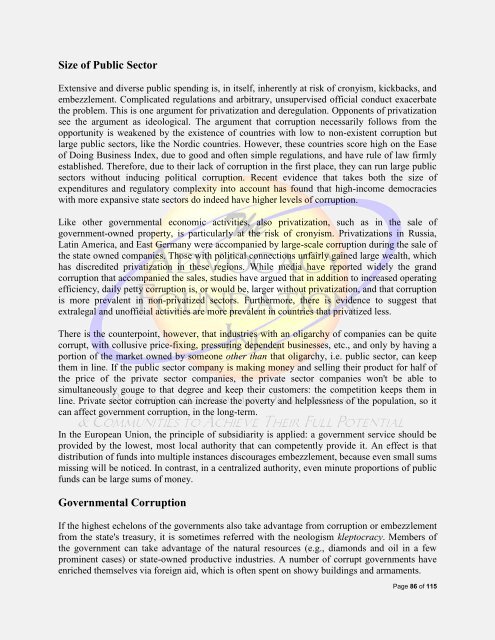Judicial ReEngineering
Judicial ReEngineering
Judicial ReEngineering
Create successful ePaper yourself
Turn your PDF publications into a flip-book with our unique Google optimized e-Paper software.
Size of Public Sector<br />
Extensive and diverse public spending is, in itself, inherently at risk of cronyism, kickbacks, and<br />
embezzlement. Complicated regulations and arbitrary, unsupervised official conduct exacerbate<br />
the problem. This is one argument for privatization and deregulation. Opponents of privatization<br />
see the argument as ideological. The argument that corruption necessarily follows from the<br />
opportunity is weakened by the existence of countries with low to non-existent corruption but<br />
large public sectors, like the Nordic countries. However, these countries score high on the Ease<br />
of Doing Business Index, due to good and often simple regulations, and have rule of law firmly<br />
established. Therefore, due to their lack of corruption in the first place, they can run large public<br />
sectors without inducing political corruption. Recent evidence that takes both the size of<br />
expenditures and regulatory complexity into account has found that high-income democracies<br />
with more expansive state sectors do indeed have higher levels of corruption.<br />
Like other governmental economic activities, also privatization, such as in the sale of<br />
government-owned property, is particularly at the risk of cronyism. Privatizations in Russia,<br />
Latin America, and East Germany were accompanied by large-scale corruption during the sale of<br />
the state owned companies. Those with political connections unfairly gained large wealth, which<br />
has discredited privatization in these regions. While media have reported widely the grand<br />
corruption that accompanied the sales, studies have argued that in addition to increased operating<br />
efficiency, daily petty corruption is, or would be, larger without privatization, and that corruption<br />
is more prevalent in non-privatized sectors. Furthermore, there is evidence to suggest that<br />
extralegal and unofficial activities are more prevalent in countries that privatized less.<br />
There is the counterpoint, however, that industries with an oligarchy of companies can be quite<br />
corrupt, with collusive price-fixing, pressuring dependent businesses, etc., and only by having a<br />
portion of the market owned by someone other than that oligarchy, i.e. public sector, can keep<br />
them in line. If the public sector company is making money and selling their product for half of<br />
the price of the private sector companies, the private sector companies won't be able to<br />
simultaneously gouge to that degree and keep their customers: the competition keeps them in<br />
line. Private sector corruption can increase the poverty and helplessness of the population, so it<br />
can affect government corruption, in the long-term.<br />
In the European Union, the principle of subsidiarity is applied: a government service should be<br />
provided by the lowest, most local authority that can competently provide it. An effect is that<br />
distribution of funds into multiple instances discourages embezzlement, because even small sums<br />
missing will be noticed. In contrast, in a centralized authority, even minute proportions of public<br />
funds can be large sums of money.<br />
Governmental Corruption<br />
If the highest echelons of the governments also take advantage from corruption or embezzlement<br />
from the state's treasury, it is sometimes referred with the neologism kleptocracy. Members of<br />
the government can take advantage of the natural resources (e.g., diamonds and oil in a few<br />
prominent cases) or state-owned productive industries. A number of corrupt governments have<br />
enriched themselves via foreign aid, which is often spent on showy buildings and armaments.<br />
Page 86 of 115

















